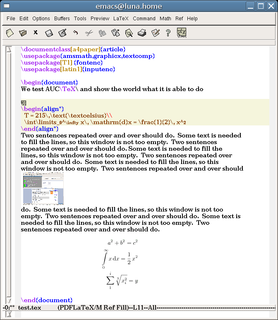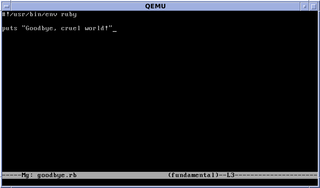James Werner Zawinski, commonly known as jwz, is an American computer programmer with contributions to the free software projects Mozilla and XEmacs, and early versions of the Netscape Navigator web browser. He maintains the XScreenSaver project which provides screenblanking for Mac OS X and for Unix and Unix-like computer operating systems using the X Window System.

Gnus, or Gnus Network User Services, is a message reader which is part of GNU Emacs. It supports reading and composing both e-mail and news and can also act as an RSS reader, web processor, and directory browser for both local and remote filesystems.
In software engineering, a project fork happens when developers take a copy of source code from one software package and start independent development on it, creating a distinct and separate piece of software. The term often implies not merely a development branch, but also a split in the developer community, a form of schism.
Ctags is a programming tool that generates an index file of names found in source and header files of various programming languages. Depending on the language, functions, variables, class members, macros and so on may be indexed. These tags allow definitions to be quickly and easily located by a text editor or other utility. Alternatively, there is also an output mode that generates a cross reference file, listing information about various names found in a set of language files in human-readable form.
Dunnet is a surreal, cyberpunk text adventure written by Ron Schnell, based on a game he wrote in 1982. The name is derived from the first three letters of dungeon and the last three letters of Arpanet. It was first written in Maclisp for the DECSYSTEM-20, then ported to Emacs Lisp in 1992. Since 1994 the game has shipped with GNU Emacs; it also has been included with XEmacs.

GNU Ubiquitous Intelligent Language for Extensions is the preferred extension language system for the GNU Project, which features an implementation of the programming language Scheme. Its first version was released in 1993. In addition to large parts of Scheme standards, Guile Scheme includes modularized extensions for many different programming tasks.
TNT is an open source instant messaging client which is designed to use AIM and uses AOLs TOC Protocol. The client is run within Emacs or XEmacs and is written in Emacs Lisp.

AUCTeX is an extensible package for writing and formatting TeX files in Emacs and XEmacs.
Lucid Incorporated was a Menlo Park, California-based computer software development company. Founded by Richard P. Gabriel in 1984, it went bankrupt in 1994.
The MULtilingual Enhancement (MULE) is computer software which adds extra written language characters to the GNU Emacs text editor and programming environment.
Hemlock is a free Emacs text editor for most POSIX-compliant Unix systems. It follows the tradition of the Lisp Machine editor ZWEI and the ITS/TOPS-20 implementation of Emacs, but differs from XEmacs or GNU Emacs, the most popular Emacs variants, in that it is written in Common Lisp rather than Emacs Lisp and C—although it borrows features from the later editors. Hemlock was originally written by the CMU Spice project in Spice Lisp for the PERQ computer.

MicroEMACS is a small, portable Emacs-like text editor originally written by Dave Conroy in 1985, and further developed by Daniel M. Lawrence (1958–2010) and was maintained by him. MicroEMACS has been ported to many operating systems, including CP/M, MS-DOS, Microsoft Windows, VAX/VMS, Atari ST, AmigaOS and various Unix-like operating systems.

mg, originally called MicroGnuEmacs, is a public-domain text editor that runs on Unix-like operating systems. It is based on MicroEMACS, but intended to more closely resemble GNU Emacs while still maintaining a small memory footprint and fast speed. An expanded version of the original is included as part of OpenBSD, where it is maintained, and snapshots of the OpenBSD version are available in the native package management trees of many other systems, including MacPorts, FreeBSD Ports, pkgsrc and Debian.

SXEmacs is a fork of the XEmacs text editor.
It runs on many Unix-like operating systems including OS X. It is notable for features such as FFI support, enhanced number types, raw string regexps, and an implementation of Pugh's skip lists.

GNU Emacs is the most popular and most ported Emacs text editor. It was created by GNU Project founder Richard Stallman. In common with other varieties of Emacs, GNU Emacs is extensible using a Turing complete programming language. GNU Emacs has been called "the most powerful text editor available today". With proper support from the underlying system, GNU Emacs is able to display files in multiple character sets, and has been able to simultaneously display most human languages since at least 1999. Throughout its history, GNU Emacs has been a central component of the GNU project, and a flagship of the free software movement. GNU Emacs is sometimes abbreviated as GNUMACS, especially to differentiate it from other EMACS variants. The tag line for GNU Emacs is "the extensible self-documenting text editor".
Haxe is an open source programming language. Multiple development environments have support for Haxe.








